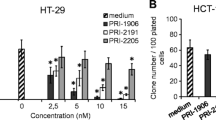Abstract
PURPOSE: In this study, we investigated the effect of the vitamin D 3 analog, EB1089, on the growth of subcutaneous xenografts of the human colon cancer cell line, LoVo, in a nude mouse model. METHODS: BALB/c Nu/Nu nude mice were inoculated subcutaneously with 10 6 LoVo cells. EB1089 dissolved in isopropanol was administered intraperitoneally and orally on alternate days at doses of 0.1, 0.5, and 2.5 μ g/kg/day. Control animals received isopropanol alone. Tumor volumes estimated using the formula 0.5×length×(width). The tumor kinetic index was determined by immunohistochemical detection of proliferating cell nuclear antigen. RESULTS: Significant dose-dependent inhibition of tumor growth was seen. After 20 days of treatment with 0.1 μ g/kg/day EB1089, mean tumor volume in treated mice was 41 to 49 percent less than that in control animals (P <0.01). Significant inhibition of tumor growth was also seen with 0.5 μ g/kg/day EB1089 after 22 days of treatment (51 percent of control P <0.01). Treatment with 2.5 μ g/kg/day resulted in weight loss that required termination of this group; these mice were subsequently found to be hypercalcemic. The tumor kinetic index was significantly lower in tumors treated with 0.1 μ g/kg/day EB1089 compared with that for control tumors (8 vs.30 percent in controls). CONCLUSION: These findings suggest that the vitamin D 3 analog, EB1089, is a potent antiproliferative agent for some human colon cancers.
Similar content being viewed by others
References
Abe E, Miyaura C, Sakagami H,et al. Differentiation of mouse myeloid leukemia cells induced by 1,25-dihydroxyvitamin D3. Proc Natl Acad Sci U S A 1981;76:4990–4.
Niendorf A, Arps H, Dietel M. Effect of 1,25-dihydroxyvitamin D3 on human cancer cellsin vitro. J Steriod Biochem 1987;27:825–8.
Colston KW, Berger U, Coombes RC. Possible role for vitamin D in controlling breast cancer proliferation. Lancet 1989;1:188–91.
Frampton RJ, Osmond SA, Eisman JA. Inhibition of human cancer cell growth by 1,25-Dihydroxyvitamin D3 metabolites. Cancer Res 1983;43:4443–7.
Minghetti PP, Norman AW. 1,25-(OH)2-vitamin D3 receptor: gene regulation and genetic circuitry. FASEB J 1988;2:3043–53.
Eisman JA, Barkla DH, Tutton PJ. Suppression ofin vivo growth of human cancer solid tumor xenograft by 1,25-Dihydroxyvitamin D3. Cancer Res 1987;47:21–5.
Katsuyuki H, Shinomiya H. Novel vitamin D3 analogs and their potential for inhibiting cancer cell growth. Drugs Future 1993;18:1057–6l.
Colston KW, Mackay AG, James SY, Binderup I, Chander S, Coombes RC. EB1089: A new vitamin D analogue that inhibits the growth of breast cancer cellsin vivo andin vitro. Biochem Pharmacol 1992;44:2273–80.
Akhter J, Goerdel M, Morris DL. A vitamin D3 analogue (EB1089) inhibitsin vitro cellular proliferation of human colon cancer cells. Br J Surg 1996;83:229–30.
Euhus D, Hudd C, La Regina M, Johnson F. Tumor measurement in nude mouse. J Surg Oncol 1986;31:229–34.
Stewart GJ, Connor JL, Lawson JA, Preketes A, King J, Morris DL. Octreotide reduces the kinetic index, proliferating cell nuclear antigen-maximum proliferative index, in patients with colorectal cancer. Cancer 1995;76:572–8.
Abe J, Nakano T, Nishii Y, Matsumoto T, Ogata E, Ikeda KA. Novel vitamin D3 analog, 22-oxa-1,25-dihydroxyvitamin D3, inhibits the growth of human breast cancerin vitro andin vivo without causing hypercalcemia. Endocrinology 1991;129:832–7.
Schwartz GG, Hill CC, Oeler TA, Becich MJ, Bahnson RR. 1,25-Dihydroxy-16-ene-23-yne-vitamin D3 and prostate cancer cell proliferationin vivo. Urology 1995;46:365–9.
Shabahang M, Buras RR, Davoodi F, Scumaker IM, Nauta RJ, Evans DR. 1,25-Dihydroxyvitamine D3 receptor as a marker of human colon carcinoma cell line differentiation and growth inhibition. Cancer Res 1993;53:3712–8.
Lointer P, Meggouh F, Dechelotte P,et al. 1,25-Dihydroxyvitamin D3 receptors and human colon adenocarcinoma. Br J Surg 1991;78:435–9.
Frampton RJ, Suva J, Eisman JA,et al. Presence of 1,25-dihydroxyvitamin D3 receptors in established human cancer cell lines in culture. Cancer Res 1982;42:1116–9.
Vandewalle B, Adenis A, Hornez I, Revillion F, Lefebvre J. 1,25-Dihydroxyvitamin D3 receptors in normal and malignant human colorectal tissues. Cancer Lett 1994;86:67–73.
Lointier P, Wargovich MJ, Saez S, Levin B, Wildrick DM, Boman BM. The role of vitamin D3 in the proliferation of a human colon cancer cell linein vitro. Anticancer Res 1987;7:817–22.
Eisman JA, Sutherland RL, McMenemy ML, Fragonas JC, Musgrove EA, Pang GY. Effects of 1,25-dihydroxyvitamin D3 on cell cycle kinetics of T47D human breast cancer cells. J Cell Physiol 1989;138:611–6.
Author information
Authors and Affiliations
Additional information
The human colonic adenocarcinoma cancer cell line, LoVo, was a gift from CRC Laboratories, Nottingham, United Kingdom.
Read at the Royal Australasian College of Surgeons Annual Scientific Congress, Melbourne, Australia, June 5 to 10, 1996.
About this article
Cite this article
Akhter, J., Chen, X., Bowrey, P. et al. Vitamin D3 analog, EB1089, inhibits growth of subcutaneous xenografts of the human colon cancer cell line, LoVo, in a nude mouse model. Dis Colon Rectum 40, 317–321 (1997). https://doi.org/10.1007/BF02050422
Issue Date:
DOI: https://doi.org/10.1007/BF02050422




